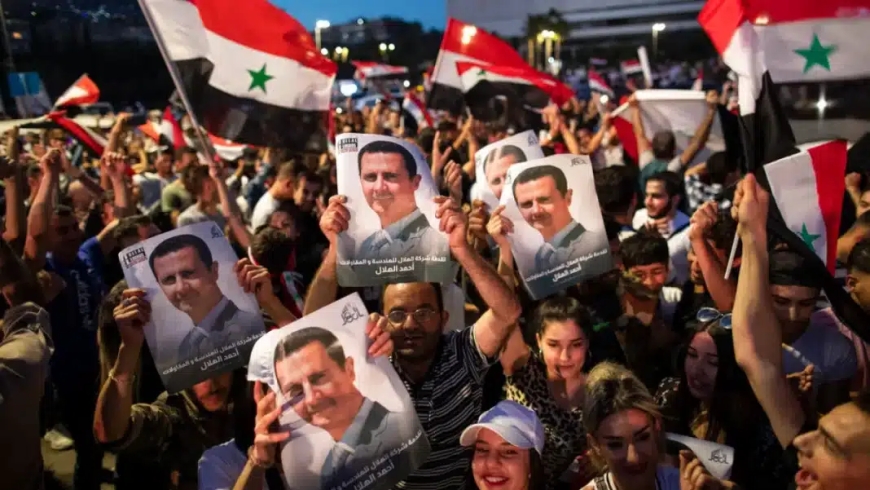Why Do Arab Countries Advocating Democracy in Syria Not Conduct Elections Themselves?
Syrian media reported that Ahmed al-Sharaa, widely known as Abu Muhammad al-Julani, made his first official foreign visit to Saudi Arabia alongside Syrian interim government Foreign Minister Asaad al-Shaibani.

The same Western and Arab countries that once declared Al-Julani a terrorist are now trying to present him as a new leader. This game will not only increase instability in Syria but also expose how the definition of terrorism is merely a political tool for Western and Arab governments, used according to their interests. Abu Muhammad al-Julani, once considered one of the world's most dangerous terrorists due to his ties with al-Qaeda, is now being courted by the very Western countries and Arab governments that once called for action against him. This situation not only reveals their double standards but also demonstrates how the West and its allies manipulate the definition of terrorism for their political and strategic gains.
Today, Sunday, Syrian media reported that Ahmed al-Sharaa, widely known as Abu Muhammad al-Julani, made his first official foreign visit to Saudi Arabia alongside Syrian interim government Foreign Minister Asaad al-Shaibani. Earlier, Arab media reported that Abu Muhammad al-Julani would visit Riyadh as part of his first official tour. Last Thursday, Saudi King Salman bin Abdulaziz and Crown Prince Mohammed bin Salman congratulated al-Julani on assuming the position of head of Syria's interim government.
Meanwhile, Syria’s new Foreign Minister Asaad al-Shaibani also made his first official visit to Saudi Arabia earlier this January. Before that, on January 24, Saudi Foreign Minister Faisal bin Farhan led a high-level delegation to Damascus, where he met with al-Sharaa and Asaad al-Shaibani. In a prior interview with Turkish media, al-Sharaa had stated that his first foreign trip would be to either Turkey or Saudi Arabia. According to analysts, strengthening Syria's relations with Saudi Arabia, Turkey, and Qatar is crucial for al-Julani. He is seeking political and economic support from Riyadh for Syria’s reconstruction.
Arab countries that advocate democracy in Syria avoid holding elections themselves because their own governance systems are not compatible with democratic principles. After Assad's fall, they may support Julani or other opposition factions to protect their interests, but they are unwilling to implement democracy within their own nations. Their calls for democracy in Syria represent a glaring contradiction. These countries claim that Bashar al-Assad's government was authoritarian and lacked political freedom. However, in their own nations, political parties are not free, the public has no role in leadership changes, and dissent is suppressed through severe crackdowns.
The policies of Arab nations are clearly based on double standards. They talk about democracy but refuse to move away from monarchy or authoritarian rule. In reality, advocating democracy in Syria is merely a political tool for them, used to weaken the Assad government and strengthen their regional influence.
The Arab countries’ call for democracy in Syria is ironic when seen in the context of their own undemocratic rule. Those who claim to advocate democracy should first implement democratic reforms within their own borders. However, they avoid doing so because it would directly challenge their power. This makes it evident that, for them, democracy is not a genuine principle but merely a geopolitical weapon.
Why Are European and Arab Countries Now Supporting Al-Julani After Previously Declaring Him a Terrorist?
1. Western Countries’ Double Standards
Al-Julani was previously declared a global terrorist by the US and European nations. He led the al-Nusra Front in Syria’s jihad against the Assad government. However, as the situation changed and Assad’s downfall became imminent, Western countries began portraying al-Julani and his organization as a “moderate Islamist group.” Now, Western and European media present him as a "local leader" and attempt to deceive the world into believing that he can establish a stable government in Syria.
2. Opportunism of Arab Governments
Arab nations, especially Saudi Arabia and the UAE, once labeled al-Julani as an extremist terrorist. However, they are now embracing him, seeing him as a potential ally who can serve their interests in Syria. The primary reason for this shift is that Arab states seek a faction in Syria that remains under their control to counter Turkey and Iran’s influence in the region.
3. Changing Definition of Terrorism
For Western and Arab countries, any group opposing their interests is labeled as a terrorist organization. However, when the same group aligns with their objectives, it is rebranded as a "rebel faction," a "local leader," or a "moderate Islamist." This strategy was previously employed in Afghanistan with the Taliban, then in Libya, and now in Syria with al-Julani.
4. Efforts to Portray Al-Julani as a Hero
Western media now depict al-Julani as a leader who has reformed his organization and seeks a “political solution.” This transformation is not accidental but part of a calculated strategy by Western agencies and Arab governments to create a “new alternative” that preserves their influence in Syria.













































